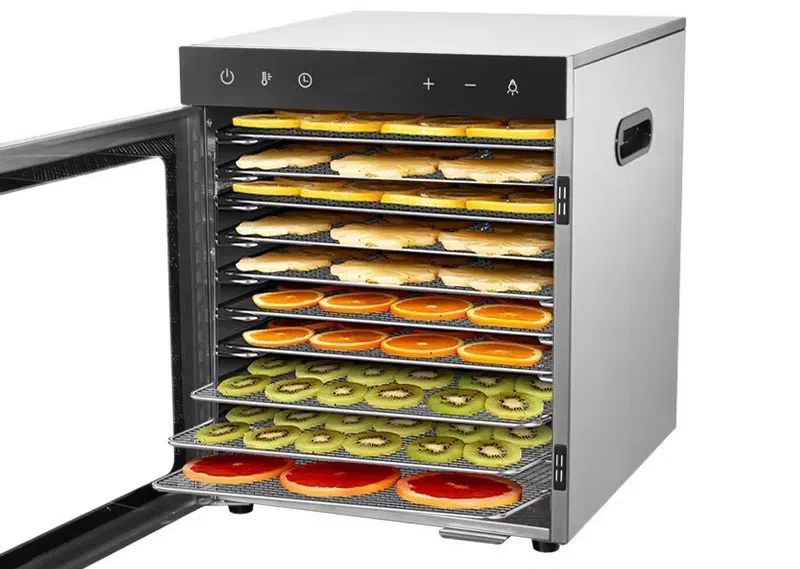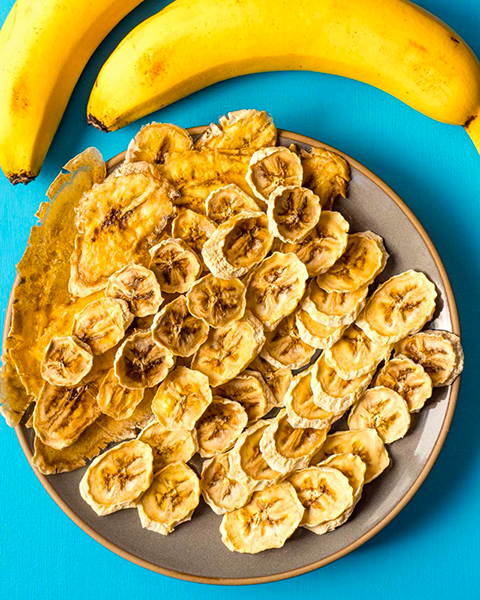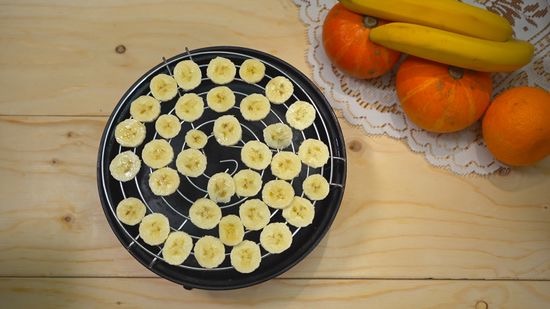
Content Menu
● What Is a Fruit Dehydration Machine?
● Factors Influencing Fruit Dehydration Machine Price
>> 1. Machine Size and Capacity
>> 2. Technology Used
>> 3. Material and Build Quality
>> 4. Automation Features
● Popular Types of Fruit Dehydration Machines
>> 1. Heat Pump Dryers
>> 2. Tray Dehydrators
>> 3. Vacuum Freeze Dryers
● Benefits of Using a Fruit Dehydration Machine
● How to Choose the Right Machine
>> 1. Define Your Needs
>> 2. Check Energy Efficiency
>> 3. Look for Customization Options
>> 4. Compare Prices
● Additional Considerations When Purchasing a Fruit Dehydration Machine
>> Maintenance and Operating Costs
>> Warranty and After-Sales Support
>> Production Capacity and Throughput
>> Technology and Innovation
● Case Studies: Real-World Fruit Dehydration Machine Prices
>> Small Business Start-up
>> Large-Scale Food Processing Company
>> Home User
● The Future of Fruit Dehydration Technology
● Conclusion
● FAQs
>> 1. How much does a high-quality fruit dehydration machine cost?
>> 2. What is the best temperature for drying fruits?
>> 3. Can I use a food dehydrator for other purposes?
>> 4. How long does it take to dehydrate fruits?
>> 5. Are dehydrated foods healthy?
● Citations:
Fruit dehydration machines are essential tools for preserving fruits, vegetables, and other food items by removing moisture. They are widely used in commercial food production, small businesses, and even households. This article explores the costs, features, and benefits of high-quality fruit dehydration machines, helping you make an informed purchasing decision.

What Is a Fruit Dehydration Machine?
A fruit dehydration machine removes moisture from fruits using controlled heat and airflow. This process preserves the fruit's nutrients and extends its shelf life. These machines are available in various types, including:
- Commercial dehydrators: Designed for large-scale operations.
- Household dehydrators: Smaller units for personal use.
- Specialized models: Machines tailored for specific fruits like mangoes or berries.
Factors Influencing Fruit Dehydration Machine Price
1. Machine Size and Capacity
The size of the machine directly affects its price. Larger machines capable of processing hundreds of kilograms of fruit at once are more expensive than smaller units designed for home use.
- Small household models: $67–$500
- Medium-sized commercial models: $2,000–$7,000
- Industrial-scale machines: $10,000–$100,000
2. Technology Used
Advanced technologies like heat pumps or vacuum drying increase the cost but improve efficiency and product quality.
- Heat pump systems: $6,300–$27,000
- Vacuum freeze-drying machines: $15,000–$100,000
3. Material and Build Quality
Machines made from stainless steel are durable and easy to clean but cost more than plastic or mixed-material units. High-quality stainless steel models can range from $1,000 to $10,000 depending on size and features.
4. Automation Features
Fully automated machines with digital controls and remote monitoring capabilities are priced higher than manual models. These advanced features can add $1,000 to $5,000 to the base price of a fruit dehydration machine.
Popular Types of Fruit Dehydration Machines
1. Heat Pump Dryers
These machines use air energy to dry fruits efficiently while preserving their natural flavor and nutrients. Prices range from $6,300 to $27,000.
2. Tray Dehydrators
These are versatile and commonly used for drying various fruits like apples, bananas, and mangoes. Prices start at $67 for small models and go up to $7,000 for commercial-grade units.
3. Vacuum Freeze Dryers
Ideal for high-end applications where nutrient retention is critical. Prices range from $15,000 to $100,000.
Benefits of Using a Fruit Dehydration Machine
1. Extended Shelf Life: Dehydrated fruits can last for months or even years when stored properly.
2. Nutrient Retention: Modern dehydrators preserve vitamins and minerals better than traditional drying methods.
3. Cost Savings: Bulk drying reduces food waste and saves money in the long run.
4. Versatility: Suitable for drying not just fruits but also vegetables, meats, and herbs.
How to Choose the Right Machine
1. Define Your Needs
Consider whether you need a machine for home use or commercial purposes. For home use, a smaller, less expensive model may suffice. For commercial operations, invest in a larger, more robust machine.
2. Check Energy Efficiency
Energy-efficient models reduce operational costs over time. Look for machines with energy-saving features like adjustable thermostats and automatic shut-off timers.
3. Look for Customization Options
Some manufacturers offer OEM services to tailor machines to your specific requirements. This can be particularly beneficial for businesses with unique drying needs.
4. Compare Prices
Evaluate different brands and models within your budget. Remember that the cheapest option may not always be the most cost-effective in the long run.

Additional Considerations When Purchasing a Fruit Dehydration Machine
Maintenance and Operating Costs
When calculating the total cost of ownership for a fruit dehydration machine, consider ongoing maintenance and operating expenses. These can include:
- Energy consumption
- Replacement parts
- Regular cleaning and sanitization
- Potential repairs
High-quality machines may have a higher upfront cost but often require less maintenance and have lower operating costs over time.
Warranty and After-Sales Support
The warranty period and quality of after-sales support can significantly impact the value of your investment. Look for manufacturers offering:
- Extended warranties
- Readily available spare parts
- Responsive customer service
- Training and technical support
These factors can justify a higher initial fruit dehydration machine price by ensuring long-term reliability and performance.
Production Capacity and Throughput
When evaluating fruit dehydration machine prices, consider the production capacity and throughput. Higher-capacity machines generally come with a higher price tag but can process more fruit in less time. This is particularly important for commercial operations where efficiency directly impacts profitability.
For example:
- A small-scale machine processing 10-20 kg per batch might cost $1,000-$3,000
- A medium-scale machine handling 50-100 kg per batch could range from $5,000-$15,000
- Large industrial units capable of processing 500+ kg per batch may cost $50,000 or more
Technology and Innovation
The fruit dehydration machine market is constantly evolving, with new technologies emerging to improve efficiency and product quality. Some innovative features to look for include:
- Smart controls: Wi-Fi enabled systems allow remote monitoring and control.
- Energy recovery systems: These can reduce energy consumption by up to 30%.
- Precision temperature and humidity control: Ensures consistent quality across batches.
While these advanced features may increase the initial fruit dehydration machine price, they can lead to significant savings and quality improvements over time.
Case Studies: Real-World Fruit Dehydration Machine Prices
To provide a clearer picture of fruit dehydration machine costs in various scenarios, let's examine a few case studies:
Small Business Start-up
Sarah, a small business owner, invested in a medium-sized commercial fruit dehydrator for her new healthy snack company. She chose a 10-tray stainless steel model with digital controls.
- Machine cost: $3,500
- Additional equipment (packaging materials, storage containers): $500
- Total investment: $4,000
Large-Scale Food Processing Company
A major food processing company upgraded its fruit drying capabilities with a high-capacity, fully automated system.
- Industrial-scale fruit dehydration machine: $75,000
- Installation and staff training: $10,000
- Total investment: $85,000
Home User
John, an avid gardener, purchased a small household dehydrator to preserve his homegrown fruits and vegetables.
- 5-tray plastic dehydrator: $89
- Additional mesh screens and fruit leather trays: $30
- Total investment: $119
These examples illustrate the wide range of fruit dehydration machine prices based on scale and intended use.
The Future of Fruit Dehydration Technology
As technology advances, we can expect to see new innovations in fruit dehydration machines that may affect pricing:
- AI-powered systems: Machine learning algorithms could optimize drying cycles for different fruits automatically.
- Solar-powered dehydrators: Eco-friendly options may become more affordable and efficient.
- Hybrid systems: Combining different drying technologies for optimal results.
While these advancements may initially come with a higher fruit dehydration machine price, they could lead to significant long-term savings and quality improvements.
Conclusion
Investing in a high-quality fruit dehydration machine can significantly enhance your food preservation capabilities while saving costs over time. Whether you're a small business owner or a home user, understanding your needs and budget will help you select the perfect machine.
When considering the fruit dehydration machine price, remember to factor in long-term costs and benefits. A more expensive, high-quality machine may offer better energy efficiency, durability, and performance, ultimately providing better value over its lifetime.
By carefully evaluating your requirements, comparing different models, and considering factors like capacity, technology, and energy efficiency, you can find a fruit dehydration machine that offers the best balance of price and performance for your specific needs.

FAQs
1. How much does a high-quality fruit dehydration machine cost?
Prices vary widely based on size and features:
- Household models: $67–$500
- Commercial models: $2,000–$7,000
- Industrial models: $10,000–$100,000
2. What is the best temperature for drying fruits?
Most fruits dry well at temperatures between 125°F (52°C) and 165°F (74°C). The exact temperature depends on the type of fruit.
3. Can I use a food dehydrator for other purposes?
Yes! Dehydrators can also dry vegetables, herbs, meats (like jerky), and even flowers.
4. How long does it take to dehydrate fruits?
Drying times depend on the fruit type and thickness:
- Thin slices: 6–12 hours
- Larger pieces: Up to 24 hours
5. Are dehydrated foods healthy?
Yes! Dehydrated foods retain most nutrients while offering a long shelf life without preservatives.
Citations:
[1] https://www.made-in-china.com/products-search/hot-china-products/Food_Dehydrator_Machine.html
[2] https://www.alibaba.com/showroom/commercial-fruit-dehydrator.html
[3] https://www.mangoprocess.com/mango-drying-machine/
[4] https://www.webmd.com/diet/dehydrating-food-good-for-you
[5] https://pocketchangegourmet.com/how-does-a-dehydrator-work/
[6] https://www.linkedin.com/pulse/common-questions-food-dehydrators-aradmachinery
[7] https://www.reddit.com/r/dehydrating/comments/1cyn1dq/new_to_dehydrating_questions/
[8] https://making.com/equipment/industrial-fruit-dehydration-machine
[9] https://www.made-in-china.com/products-search/hot-china-products/Fruit_Drying_Machine_Price.html
[10] https://www.webstaurantstore.com/13129/commercial-food-dehydrators.html
[11] https://www.seriouseats.com/best-food-dehydrators-5216308
[12] https://www.thepurposefulpantry.com/dehydrating-faq/
[13] https://www.youtube.com/watch?v=Zl4wTcCPJu0
[14] https://excaliburdehydrator.com/pages/faqs
[15] https://www.dryer.com/fruit-drying-times
[16] https://www.dehydratorsamerica.com/category/shop-all
[17] https://www.walmart.com/browse/home/food-dehydrators/4044_90548_90546_133025_5836222
[18] https://www.aliexpress.com/category/200216235/dehydrators.html
[19] https://www.thespruceeats.com/best-food-dehydrators-4077285
[20] https://www.webstaurantstore.com/guide/741/food-dehydrators-buying-guide.html
[21] https://themessybaker.com/2013/09/20/eight-reasons-food-dehydrator-worth-space-money/
[22] https://extremewellnesssupply.com/blogs/news/how-does-a-dehydrator-work
[23] https://airtekdehydrator.com/blog/what-a-fruit-dryer-machine-can-do/
[24] https://www.thegearpage.net/board/index.php?threads%2Fquestion-on-dehydrating-fruit.2277286%2F
[25] https://www.dehydratefood.info/faq/
[26] https://www.dehydratorsamerica.com/category/industrial-food-dehydrators
[27] https://www.waring.com/10-tray-dehydrator/WDH10.html
[28] https://excaliburdehydrator.com/collections/commercial-dehydrator
[29] https://www.theseasonalhomestead.com/9-benefits-of-dehydrating-food-that-may-surprise-you/
[30] https://www.mitchellcooper.co.uk/what-is-a-dehydrator-commercial-buying-guide
[31] https://www.ivins.com/wp-content/uploads/2021/04/RCP-Dehydrating-101.pdf











